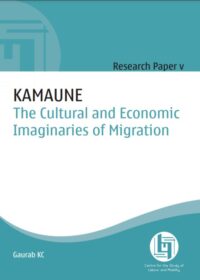Publications
KAMAUNE: The Cultural and Economic Imaginaries of Migration
A large number of Nepalis have flown to the Gulf countries and countries in East and Southeast Asia for employment, leaving their primary kin members at home. This paper attempts to understand the rationale for out-migration from the vantage point of those ‘left behind’ primarily kin members, regarding the ones ‘who left’ – the migrants. This study is primarily based on the findings of a three-month-long fieldwork, conducted in 2009, in Gwaldaha of Chalnakhel Village Development Committee in Kathmandu District. The research explores and analyses various dimensions of male out-migration from the perspective of the Gwaldaha community. Despite varied life histories and experiences, the majority of the villagers indicated that a family member’s decision to migrate was tied to the notion of kamauna, meaning ‘to earn’. Kamauna is an economic term, but it holds a distinct multifaceted cultural meaning in the context of local households and the socio-cultural milieu of Gwaldaha, whereby kamaune, the act of earning, is imbued with present needs and future dreams. This study unravels this vernacular notion, comprised of multiple meanings in the context of my research.

